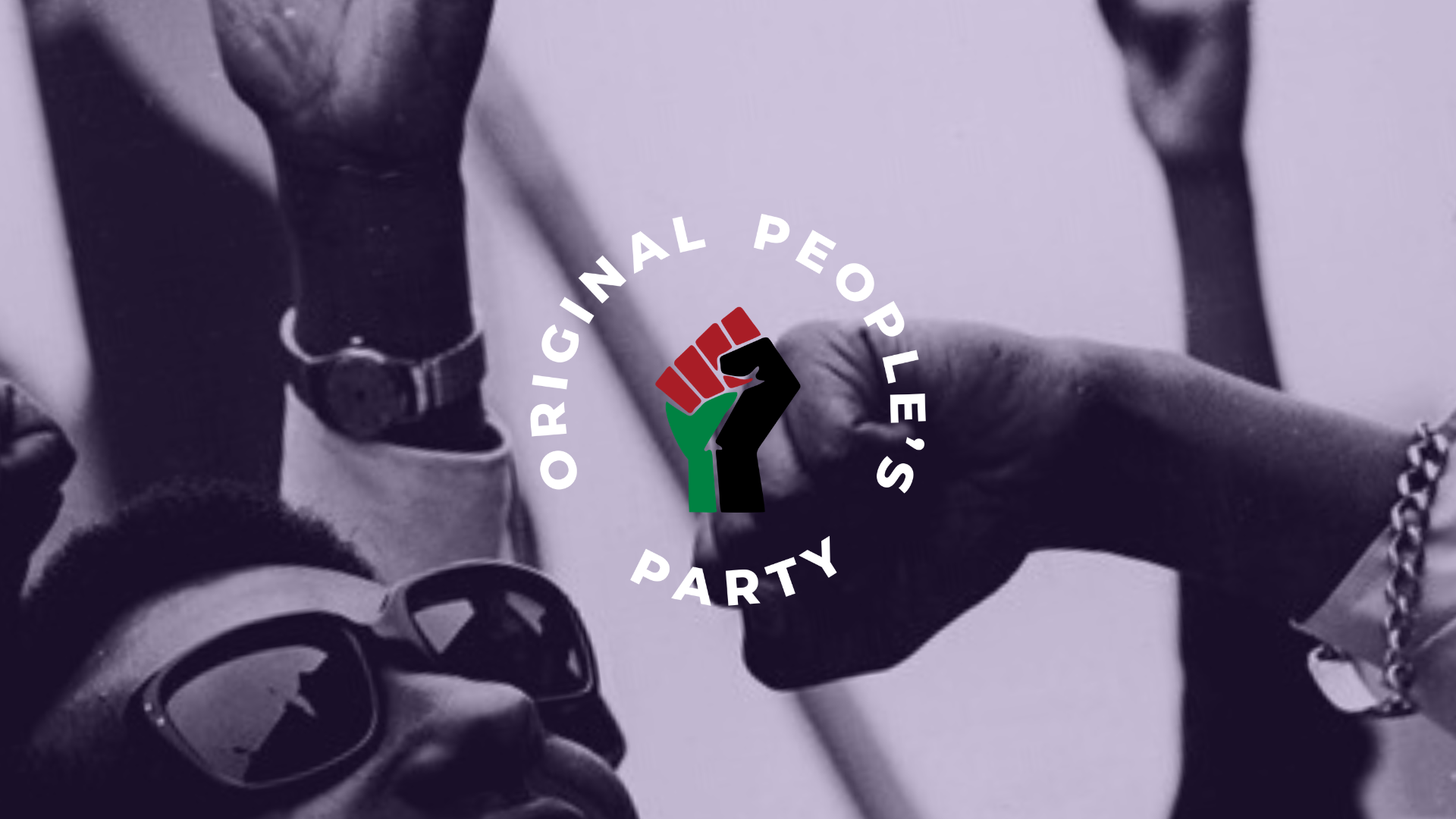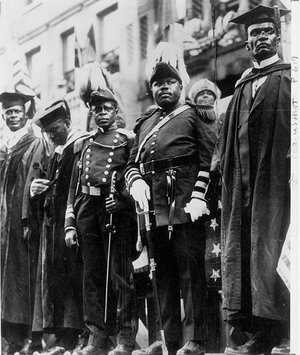By Deshawn Coy
To answer this question, I will be using this essay to effectively elaborate on race-first philosophy and its ideological foundation within the Original People’s Party (OPP). The concept of race-first represents an ideological wing of the overall Pan Afrikan movement, prolifically articulated by the Most Honorable Marcus Mosiah Garvey, founder of the Universal Negro Improvement Association (UNIA). It is defined for Black Afrikan people and their descendants to organize and mobilize for the collective upliftment of the race, as opposed to being dependent on other external groups to solve our problems. During Garvey’s era and at times contemporarily, a response to this ‘race first’ philosophy is labeled as ‘racism’ or ‘reverse racism’ by critics. It is my intention to dispel this notion by providing historical context and the fragile alternative of using intersectional/class orientation as the foundation for coalitions or alliances with non-Black Afrikan peoples.
I will start by explaining Garvey’s views on race first. Garvey biographer Tony Martin, explains Garvey’s views in Race First detailing “The urgency Garvey felt for racial independence and self-reliance led him to argue that in independent endeavor lay the only hope of an eventual solution to the problem of race prejudice. The white race would cease its aggressiveness toward the black when it was met by independent black power of a magnitude equal to its own.” [1] Martin quotes Garvey stating “White prejudice was manifested not because there is a difference between us in religion or in colour, but because there is a difference between us in power.” [1] In Philosophy & Opinions of Marcus Garvey, Garvey states:
“So long as Negroes occupy an inferior position among the races and the nations of the world, just so long will others be prejudiced against them, because it will be profitable for them to keep up their system of superiority. But when the Negro by his own initiative lifts himself from his low state to the highest human standard, he will be in position to stop begging and praying, and demand a place that no individual, race or nation will be able to deny him.” [2]
As I’ve articulated, these beliefs are what served as the foundation for Garvey and the UNIA which allowed it to amass millions of members during the height of the movement. It is my belief that this philosophy, along with the historical and biological connection of us, being the original man and woman of this Earth, that we as Afrikan people can complete Garvey’s and the ancestors’ vision.
The following section of this essay is not to dismiss the need (at times), for intersectional and multi-racial/national solidarity; instead, it’s an argument to highlight aspects of the weakness of using it as a primary foundation to politically operate towards solving the problems of our race. Historically, individuals or groups who have identified themselves as sympathetic whites, Marxist, or communist, have at varying degrees attempted coalitions in solidarity with the African struggle; often viewing and proposing solutions to political issues primarily through a race-neutral class lense. I will provide historical examples where these interests have conflicted and often overridden their class orientation goals.
To start off, we will use one of Garvey’s contemporary critics of the 1930s time period, George Padmore. Padmore, a communist, denounced Garvey as a fraud and accused him of using the plight of Black people to promote the ‘class interests’ of the Black bourgeoisie and landlords, according to Tony Martin. [3] However as time went on, Padmore became aware of the contradictions of communism, given the communist Soviet Union’s tacit support of fascist Italy’s invasion of Ethiopia and American communist hostility toward Black civil rights activists during World War II. [3] This exemplifies that while a communist state such as the Soviets, may claim to be ‘class-oriented’ and aligned with globally oppressed people, that does not exempt them from assisting a fellow European nation if its in their geopolitical interest. Padmore would later depart from the communist movement in the 1940s and embrace elements of Garvey’s views on race first philosophy. Another communist example is seen in China during the Cold War era, where China ended up aligning with the Western imperialist intervention of the Angolan independence conflict, which is written in greater detail by Dwayne Wong.
In contrast to the communist examples, Garvey’s fiercest contemporary rival, W.E.B. Du Bois, during his NAACP days, was a staunch reformist/integrationist. Believing that by appealing to the consciousness of ‘well-meaning’ whites and aligning with them, Du Bois conducted scientific social studies in literary works to provide evidence of white people’s ignorance to the Negro problem to gain political reforms. However, after years of data research and political agitation, Du Bois came to the following conclusion in an excerpt from his 1940 Dusk of Dawn autobiography:
“I began to be deeply and disturbingly aware that with all the success of our agitation and propaganda, with the wide circulation, reading and attention which the Crisis [NAACP magazine] enjoyed, with the appearance of Negroes on the lecture platform everywhere, and the emergence of a distinct and creditable Negro literature, nevertheless the barriers of race prejudice were certainly as strong in 1930 as in 1910 the world over, and in certain aspects, from certain points of view, even stronger.
Or, in other words, beyond my conception of ignorance and deliberate ill-will as causes of race prejudice, there must be other and stronger and more threatening forces, forming the founding stones of race antagonisms, which we had only begun to attack or perhaps, in reality, had not attacked at all. Moreover, the attack upon these hidden and partially concealed causes of race hate must be led by Negroes in a program which was not merely negative in the sense of calling on white folk to desist from certain practices and give up certain beliefs; but direct in the sense that Negroes must proceed constructively in new and comprehensive plans of their own.” [4]
Thereafter, Du Bois embraced many of the race-first/self-reliance views that he attacked Garvey for during the peak of their political disagreement in the 1920s.
In conclusion, I believe both race and class should be accounted for in political analysis in the search of solutions to our people’s problems. However, as stated previously in my opinion, a race-first philosophy can be a stronger foundation for lasting solidarity on which class analysis can be built on given the historical bonds that tie Afrikan people together. This is seen in varying degrees in the post-Garvey era which his influence reaching from here in the United States with the Nation of Islam to the Motherland, influencing post-colonial African independence leaders and movements in the latter part of the 20th century.
I will end this essay using a quote from our dear ancestor, Dr. Amos Wilson, providing further psychological analysis towards why a race-first foundation is important:
“Most often a group is formed based on the sharing among its members of a common history, set of values, fat, plight, or on their consciousness of a shared collective identity, e.g., socioeconomic class, political or social category, or ethnicity. These shared factors form [the] basis for the construction of a group solidarity and the use of solidarity to generate and exercise social power.
The achievement of group solidarity and organization results from the mobilization of previously disunited individuals in order to create or activate power they may already have possessed but could not employ due to the absence of will and a facilitating group ideology.” [5]
References
- Tony Martin, Race First: The Ideological and Organizational Struggles of Marcus Garvey and the Universal Negro Improvement Association, Pages 32-33
- Amy Jacques Garvey, Philosophy & Opinions of Marcus Garvey, Page 26, Subtitle: ‘Race Assimilation’
- Tony Martin, Race First: The Ideological and Organizational Struggles of Marcus Garvey and the Universal Negro Improvement Association, Pages 262-265
- W.E.B. Du Bois, Dusk of Dawn, Pages 141-142
- Amos N. Wilson Blueprint for Black Power: A Moral, Political, and Economic Imperative for the Twenty-First Century, Page 45
Interested in joining OPP? Join here!
Follow me on Twitter @DeshawnCoy


